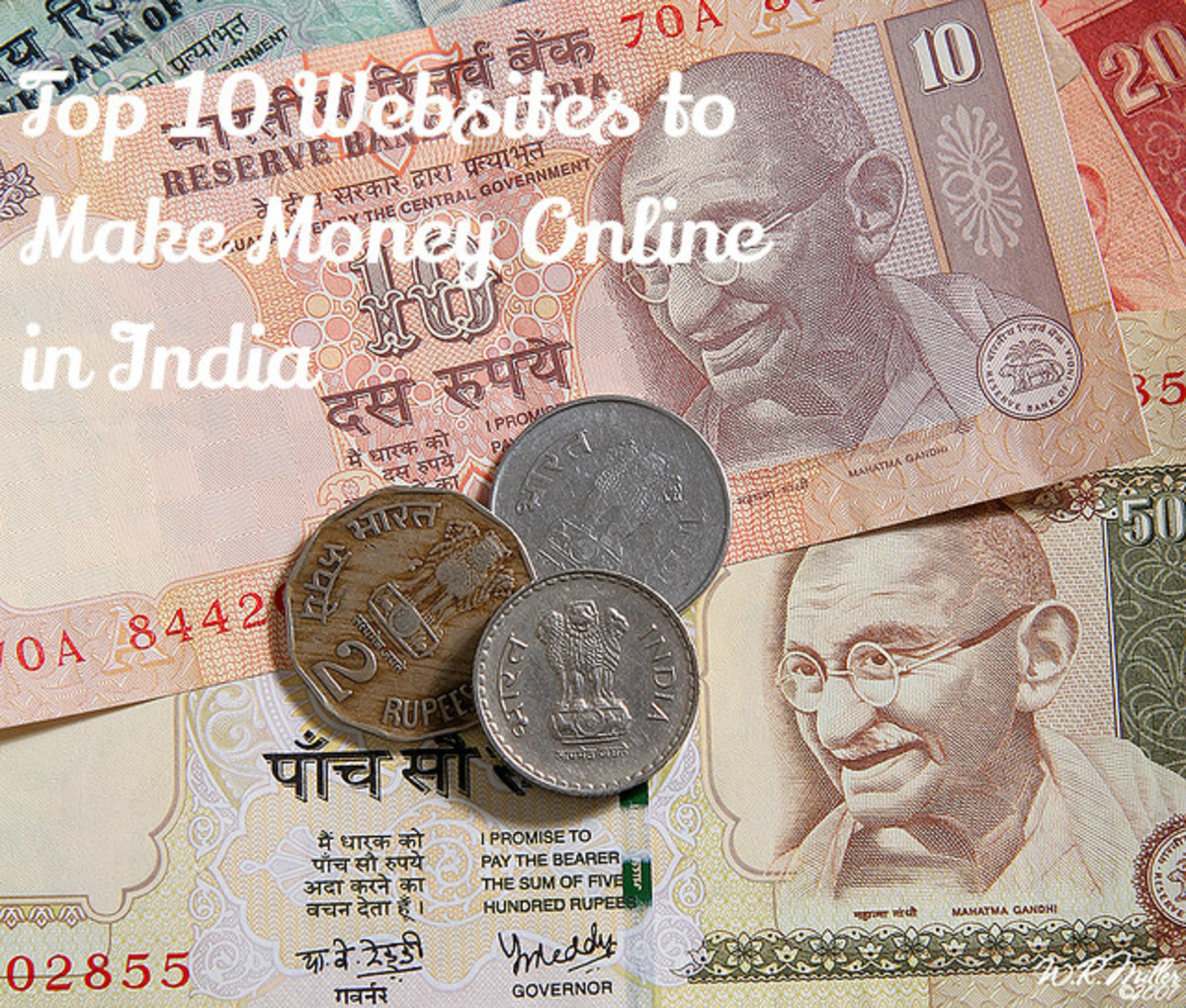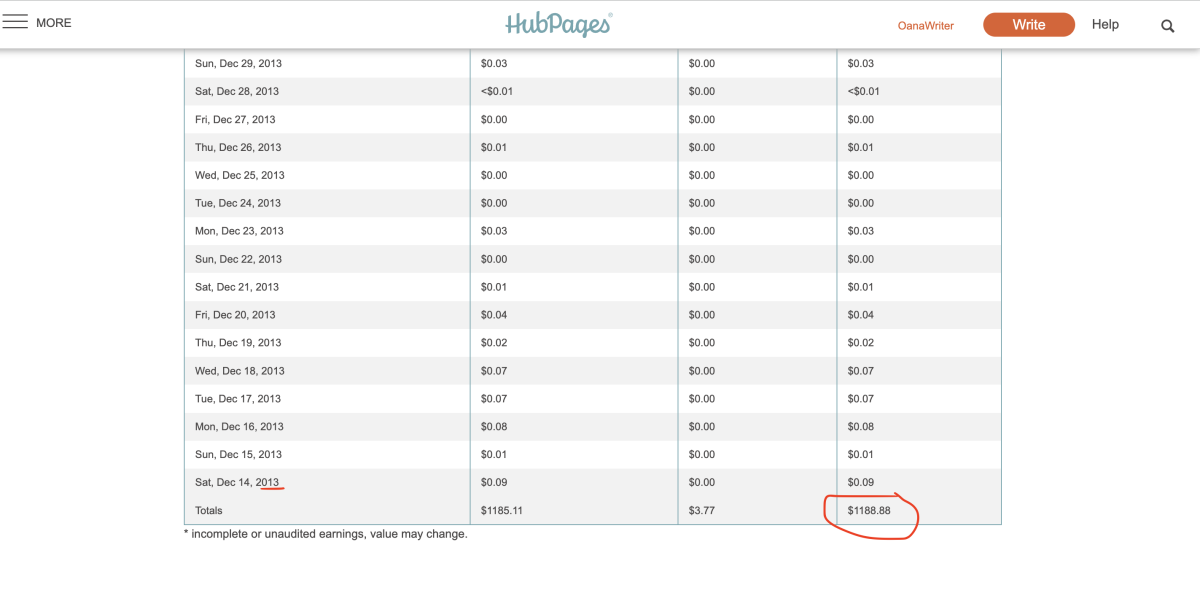How To Make Money With Adsense Part I - A Guide to Better Profits
This Article was Written for You
I was once like you ... looking for that 'one thing' that would help me increase my adsense revenue. I read one article and discovered it was 'this' then I read another article and discovered it was 'that', and became all the more confused as I fell into a never-ending rabbit hole of knowledge that was beyond my grasp to understand. I was learning acronyms like SEO, KEI, SOC, etc., andI began to wonder ... why must this be so difficult?
For a while, I blamed others for my lack of understanding. Why couldn't they make it easier for me? Was there some great cabal out there sharing knowledge in a secret language? Were they purposely dangling the carrot in front of me to watch me dance? Anguish and despair. So many nights I felt hopeless, as I watched the pennies roll in ... and one night I finally gave up ...
What? That's it? Obviously not, or this article would never have been written. For, you see, I realized why I wasn't 'getting it'. I'm one of those people who needs real world analogies to understand things. I also need better reasons for doing things other than ... 'that's the way it's done'.
And so, I picked through many online articles and started compiling the facts on a piece of paper, and then I went through the tedious process of translating them from techno babble to common English (not an easy feat, I assure you). I then sat there and smiled as an epiphany waved over me ... 'This doesn't have to be all that darned difficult!'
And so, I'm here to share that translation with you, and my hope is that you will have the same epihpany when you are done reading it. I will also tell you that my method is not a 'get rich quick' method. What I propose to you will take time and effort, but you will see a steadily increase in your adesense revenue if you give what I have to say a listen.
So, having said all of that, let's start by getting a better understanding of how adsense works, which will lead you to that first nugget of information you will need to become successful.

How Does Adsense Work?
To learn about something, you need the object in front of you so you can poke and prod at it, helping you to make sense of it all. As such, this article you are reading is a live representation of how to write to earn more adsense from your writings. Having told you that, I can now move on with the discussion.
Writing articles for profit is nothing new; people have been doing it for years. The premise is simple ... You write about a topic (for the sake of argument, let's say you chose boxing) and then adsense places ads on your site that relate to your article (maybe an ad relating to a website where you can purchase boxing equipment).
Now ... here's the question that will keep you up all night ... Where do those ads come from?
Well, it's like this. You see, there are companies out there who want to sell things and they want to advertise them to the right people, as advertising them to the wrong people won't net any sales ... and might even start a few fist fights.
Imagine reading an article titled 'Say No to Fur!'. Now, this article is all about people hunting down cute, little furry critters and making fur coats out of them. You read the article, and you are hopping mad. 'Down with real fur!', you shout at your monitor ... and as you continue through the article you see an article for a shotgun .. the same weapon used to kill those cute, fuzzy little critters. Now, I'm not saying the article won't get some clicks, but the reader's intent will be to hunt down the advertiser, not small game. As such, targeted advertising is needed to get the right ads to the right people. Luckily, for you and me, Google is a master at this, and adsense is the vehicle that makes it all work.
You see, Google looks at your page and determines (from your article content) what ads would work best. they then display these ads whenever someone looks at your article. And why do they do that? For profit, of course. Those advertisers pay Google for those ads, and those fine, little critters at Google see to it you get part of the proceeds. Rightly nice of them, don't you think?
Putting it in a nutshell ... you write the article, they place the ads, people click the ads, and you and Google both get paid. That's how adsense works.
You Need to Get Your Article Seen
Do you smell that? No, that's not Aunt Petunia's roast burning in the oven, that's your mind racing forward to your first epiphany! You need people to click on the ads to make money, but they can only click on those ads if they open your article. So ... you just need to get people to your article, right?
Kinda, but not entirely. You see, it isn't enough to get people to your article. Now, don't get me wrong, a lot of visits to your article is a goal, but getting them there is only half the battle. To get those clicks you'll need to buy them from the reader - that's right, buy them - and fortunately, the words you write are the currency you will use. Here's a truth I want you to write down and memorize ... 'Adsense will never freely hand you a profit ... you need to work to earn your money.' And, I will add another 'You profit the most when you work the smartest' ... and when I get done with you, I'll see to it that you're a lot smarter than when you first started to read this article.
So, how exactly do you get your article seen?

Google is Greek for Traffic
Yep, that's right. Google will lead the traffic straight to your door, provided you play fair and learn what they expect from you.
'And what is it they want?', you may ask. Google wants your site to be an authority on a topic. 'Really?' Yes, really. Remember, Google makes money selling targeted ads, and it's far easier to get Joe Advertiser to fork over his advertising money when he is assured that the advertising campaign will be a success. It's all about exposure, which is why Gogole is every bit as interested in seeing those clicks as you are. To that end, you need to do everything you can to earn those clicks.
Now, the first thought that comes to mind is to place a huge 'click the thingy' banner under the ads, but Google says no to that, and so do the advertisers. When they get a click, they want it to be from someone who is 'ready to buy' not someone who has been duped into looking at their site. The reasoning for that is because they pay for every click and not all will be sales. Therefore, they would at least like each ad to have a 'possibility' of being a sale. That's where you come in ... you provide that possibility by selling a concept with your article - and hopefully one that will place the reader into the mood to look at one of those ads.
That's where Google comes into play. Like bookends, Google delivers the traffic to your site, then (with any luck) wisks them away to an advertiser's site, providing a profit for a click. Now, we already said Google demands that you always play fair (they'll ban you real quick if you don't), so you have little control over getting someone to click. The reason I didn't state 'you have zero control' is because your article has some weight on that ... but we'll get into that in a bit. For now, it is important to know that we have more control over getting Google to lead people in, so we will start fighting the war on that end. Still with me? Good!
Rank is Everything!
Picture yourself looking for something on the internet. You type a search in Google for 'peanut butter pie' and you get a set of hits. Great! Now, which one do you look at? Well, you start by looking at the title of the first link and asking yourself 'Is that that I'm looking for?' If it is, you look at the description and ask yourself 'Am I certain this is what I am looking for?'. If so, you click on the link and look at the article. If not, you move onto the next entry until you find the article that you are seeking.
Now, this small example alone should provide another gasp of smoke from the old noggin - the higher you rank on Google, the better odds of your site receiving traffic. However, you need to clear the smoke to receive two other highly important facts:
- The title of your article is *very* important, as that's the first thing the reader looks for
- The description of your article is also *very* important, as that's the second thing the reader looks for
When you write your article you will be given a chance to chose a title. As for the description, you might get a choice on that as well, or it might be automatically pulled from the first paragraph that you write. If it is, make that first paragraph a doozy where you tell that reader 'this is what you are looking for - read my article!'. Not in those words, of course, as this is alos 'not playing fair' and does make yu look rather foolish, like a small, little schoolboy crying out for attention.
So, how do you get ranked up on the first page of Google? Well, everyone has a formula, but none of them seem to work for every article. The fact is, there are no absolute guaranteed methods, but there are ways to increase your odds greatly. To do so, you will need to use a free tool on the internet calledThe Google Adwords Keyword tool, known affectionately as GAK.(Yeah, I know, it sounds like something you do New Year's Day, but this tool is free and it's very worthwhile taking the time to learn how to use it).
At this point you will want to bookmark this article and read the article I wrote on this wonderful tool, as I will be talking about it a lot and you will understand what it is I am trying to tell you. So, bookmark this page and have a look at this article:
- Yoshi's Hubbing 101: Finding tags (also known as key...
This article describes how to use the Google Adwords Keyword Tool. Be sure to return as soon as you understand it all, as I have much more to share with you.

Getting Ranked on Google
Okay, now that we know how to find keywords, I'll tell you the kind we are looking for - long-tailed keywords. And you ask ... what in tarnation is a long-tailed keyword? Why, iIt's a keyword made of three or more words. And why should these interest you? Because these are the ones which will offer the least competition, which allows us a higher ranking in Google.
As an example, you probably could never rank well for 'building', 'log cabin', or home', but you might be able to rank decently for 'building a log cabin home'. And why is that? Glad you asked!
You see, in the land of Google, searching for 'building' could get you hits on 'building', 'building a house', 'building a dog coup', etc. It's not very specific, so it can be found in a lot of other searches. That's what makes it a bad keyword to use, as it's already overused. You're better off going with something a bit more rare, such as the phrase 'building a log cabin home'. Of course, you will also have a lower search volume, but there are workable ranges:
- local search count 2000 or higher
- Average CPC of at least $1
The local search count is how often last month your keyword phrase was searched for in Google. In my article (you read it, right?) I recommended doing an exact match search, as this will tell you how many people searched *specifically* for the keyword phrase you want to use. These are people targetting what you are writing about.
The average CPC is the average cost per click advertisers are paying for this search term. The higher the CPC, the better the odds that you and Google will both net a decent return for each ad clicked.
So, with all of that in mind, find a good keyword phrase and we will work with it. As this web page is a live model of how to make adsense work for you, I have chosen a keyword phrase I believe I can make work for me: The phrase I chose was 'Increase Adsense Revenue'
Ah yes, I hear those gears grinding again. You saw those same words in my article title, didn't you? Yep! That's what the keyword research is all about ... finding your article title and your URL. And what do you do with this info? First, you make sure you place that keyword phrase into your article title 'as is' without any modification. Then, you ask yourself, can I make this title look better by adding words before it ... after it ... or both. If you can, then do so. Remember, people read articles, not Google, so we need to make this title appealing for those looking to read our article.
A word of warning: *Do not* mislead your reader! If you find a great keyword phrase but it doesn't match what you are writing about, toss it away or write an article that matches that keyword phrase. If you chose to ignore me on this one, you probably won't get any clicks on your ads, and you will stand a good chance at getting banned from adsense by Google. Always, always, always, play fair with the reader. You will profit better through honesty in the long run than you ever could by deception. As you read more of this article you'll begin to understand why.
As a final note, you will need to know how many competitors are out there writing about the same thing. So, open up Google and type in your keywrod phrase in quotes, like so: 'increase adsense revenue'. Towards the top of the page and off to the right you will see 'Results 1-10 of about xx,xxx'. The x's represent the number of pages on the internet specifically geared toward that phrase. If this number is higher than 20,000 you might want to consider another keyword phrase, as that one will be difficult to rank for. Why? Because you are standing in ine with many other articles, and unless yours shines better than theirs, you'll be buried down on lower pages, pushed into obscurity to never be found.
Content is King
Many will argue that you'll need to write an article with a high keyword density that is rich in monetizing keyword phrases and then create tons of backlinks... and as you read that I saw your jaw drop.
What in tarnation does all of that mean? Unless writing articles on the internet has become your only profession in life, it means nothing. You don't have endless weeks to study endless techniques to make your site more visible ... and besides ... we stepped aside from all of that by chosing a keyword phrase that was easier to rank for, making these extra finishing touches unneccessary.
Now, if you find yourself consistently number 5 on page one in Google, you might want to give them all a listen to get to number 1, but for now, we arejust looking to get on the front page and generate some revenue, which means accepting that we must learn how to hold the golf club before we can ever hope to learn how to play golf.
With that said, we move to our final discussion ... content. Now, I said earlier, 'Google wants your site to be an authority on a topic'. I even went into the reasons why. So, how does one become an authority? Well ... it seems like a cheap way to do things, but you Google your topic and research it to the point you understand it better than you thought you did when you first decided to write your article.
The reasoning is simple ... you want your article to be the most informative one available. And, to what purpose? Well ... if someone really likes your article they tell their cousin Bob, their Aunt Gertrude, their neighbor Paul, and so on and so on ...And ifyou really appear to be an expert, then others will link their site to yours,which tells Google your article is worthy of that crawl up toward the front page.
Now, I could offer endlless testimonials and proof on this, but I won't. You see, it's a common sense thing. Google attempts to place the most relevant articles on the front page, and you start on the road to becoming the most relevant content by writing 'the most relevant content'. That's why 'content is king'.

The Final Piece to the Puzzle
Having done all of that, what's left? Time and patience ...
You see, you can rank a page naturally or you can rank it artificially. To rank a page artificially you need to spend about a day doing a whole lot of technical things that will lead you into having to do them all over again every several months. Now, I think you're the kind of critter that prefers to write more and strain less, which is why I recommend you write it ... and then forget about it - let it simmer for two to four months. In that time you will see your page rise and fall through the rankings, but if you have done what I have suggested, you should see it rise up to - or near - the front page of Google. A lot of where you wind up depends on the strength of your content - and the strength of the competition.
Another added benefit to keeping the content in focus is that it really sells your ads.
Picture this ... you're reading an article on fly fishing in the Yukon and you are being wisked away in your mind. You then come along an ad for a really nice fishing pole. Caught up in the moment, you just might click on that ad out of curiosity - your stuck in the Yukon without a pole, so of course you're going to go for that ad.
It actually does happen that way That's why you need to sell yourself as 'the expert' and capture your audience with your words. To this end, you need to write enough to cover your topic thoroughly, make as few grammar and spelling mistakes as possible, and remember that a picture is worth about five hundred words, which means you should insert at least one picture for every five hundred words you write, to break up the monotony.
Please note that substituting pictures for material will get you nowhere - at least not with adsense. Let the words do the talking and use pictures sparingly to give your reader a break. So, if you are planning on doing an article with a lot of pictures of someone really famous, plan on a lot of page hits, but no money in return, as these kinds of pages rarely turn a profit. Part of the reasno could be that the ads are lost amid the pictures, or because the reader gets lost in the view. Either way, write articles of words and save those five thousand pictures of Angelina Jolie for a fan shrine - you'll profit much better that way.
How Much Can You Expect to Make?
Your first month? Pennies, if you're lucky. However, it all begins to change as the second month rolls around and those pennies turn into a few dollars. Provided you picked a year-round topic (topics that sell year-round, unlike Christmas and Halloween) then you can typicially expect your profits to double over each month until they finally plateau about eight months later.
As a rule, an article should be achieving about one ad click per 50 page hits by the end of the second month. If your not seeing this kind of a turnover, then your article might not be informative enough or you might have picked a topic that doesn't cross over well to revenue. Articles that discuss 'writing techniques' (oddly enough) fit into this category, but the ballgame changes when you delve into articles about 'writing for profit'.
Write well, become an authority, and the dollars will roll in over time. Just don't fool youurself into thinking this is your 'road to riches' as only a few will ever amass enough wealth writing articles to become the next millionaire. Just tell yourself each day ... I'm doing this to make some extra cash.And what if you do become that next millionaire? Email me and I will allow you the chance to mail out a charitable contribution to myself, for being there to inspire you onto greatness. Personally, I'd be happy just to hear how months later you were able to use your extra income to pay the light bill each month.
On a final note, don't plan on one article doing all of the work. Some articles pay out and some become clunkers. Sad fact is, there is no formula for knowing which will occur, so you will need to write many articles to offset those losses. Trust me ... If you write enough articles in the way I describe above, you'll write enough moneymakers to forget all about those that produced nothing. Also, over time you will find which topics work better than others. Did you make money today writing about eye surgery? Well then, write about another type of surgery tomorrow. The thing is, you need to keep writing them and forget they exist. In time, when the money comes in, you'll be thankful you listened to ole Yoshi! :)








